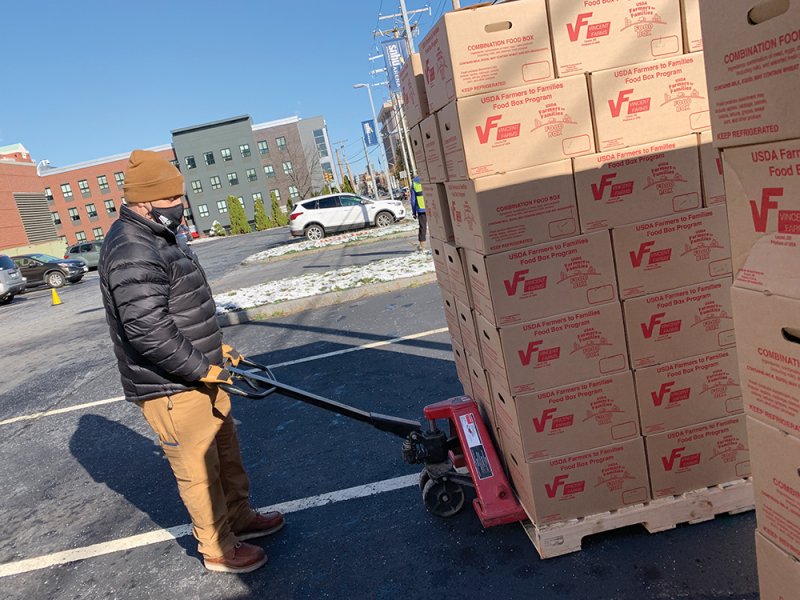 Patrick Tufts, CEO of Granite United Way, helping to distribute more than 177,000 pounds of food to NH families in need. Courtesy photo.
Patrick Tufts, CEO of Granite United Way, helping to distribute more than 177,000 pounds of food to NH families in need. Courtesy photo.
For more than a century, Granite United Way reached donors at their workplaces or in their living rooms with traditional face-to-face conversations. Now with benefactors sitting tight in their homes to buffer against the coronavirus, CEO Patrick Tufts finds himself broadcasting to 300 boxes on a Zoom screen from his office.
Tufts, a fundraising veteran, laments the loss of that personal connection. It is challenging to maintain contact with people who still depend on a paper pledge card.
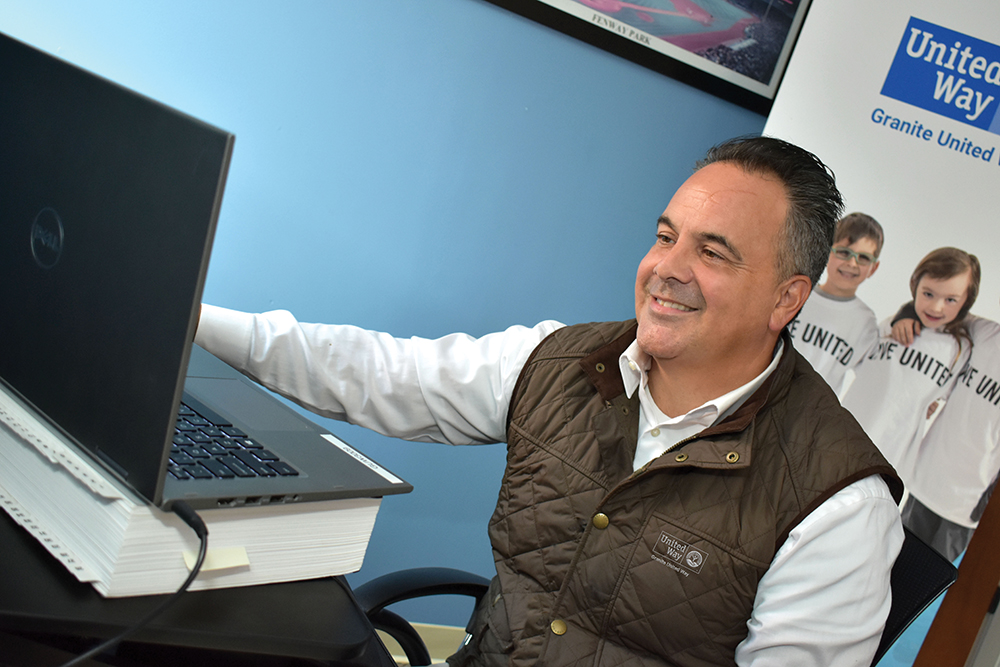
Patrick Tufts reaches out to donors via Zoom. Courtesy photo.
Shortly before the coronavirus pandemic shattered the national economy, Granite United Way’s annual campaign spurred giving of $9.3 million from corporations and individuals. In the aftermath of the crisis, the organization’s board of directors wasted no time appealing again to the same donors for another million dollars of relief funds.
To sustain the 800 nonprofits Granite United Way supports, Tufts says he once again needs to pursue his cohort of givers a third time in less than six months. The challenges brought about by the coronavirus pandemic leave him no choice.
Granite Staters are seeing their paychecks dwindle, fueling the demand for canned goods, fresh produce and online literacy tools for students. Volume at the 211 NH call center for COVID-19 information and resources, which the United Way runs, has nearly doubled.
“In my career I’ve dealt with 9/11, Katrina, marathon bombings, recessions. Nothing I’ve dealt with has had the shelf life of this crisis,” Tufts says.
Nonprofits that provide a social safety net are scrambling to meet the demand, says Kathleen Reardon, executive director of the NH Center for Nonprofits. Meanwhile, nonprofits like art museums, theaters and camps shuttered for months are struggling to reopen in ways that make employees and clientele feel safe (see story on page 38).
Despite a panicky predicament, Reardon says, “There were remarkable instances of generosity that we experienced from foundations, corporations and individuals.” A case in point is the $4.1 million the NH Charitable Foundation (NHCF) collected for its Community Crisis Action Fund, with gifts ranging from $25 to $1 million.
Nationally, giving in the first half of 2020 spiked 7.5% compared to the first half of 2019, according to the Association of Fundraising Professionals. Smaller donors were the champions of this response, with the number of those giving less than $250 surging 19.2% compared to the first half of last year.
The global philanthropic response to the COVID-19 pandemic has been unprecedented, surpassing $15 billion, according to an analysis by Candid, which measures and analyzes global philanthropy. The U.S. alone contributed more than $5.4 billion in grants, more than double the entire campaigns for 9/11, the 2008 financial crisis, Hurricane Harvey, the Ebola outbreak, the Haitian earthquake and the recent Australian bushfires.
In the Granite State, the Governor’s Office for Emergency Relief and Recovery (GOFERR) is also doing its part. GOFERR awarded $39,792,601 to nearly 500 nonprofit 501(c)(3) organizations through the Nonprofit Emergency Relief program administered by the NH Center for Nonprofits, the NH Charitable Foundation and the NH Community Development Finance Authority.
For example, the Appalachian Mountain Club received $1 million after they had to close their huts, losing the fees hikers pay to stay in the White Mountains. The Palace Theater in Manchester, which operates three other venues in addition to its flagship Hanover Street location, had to cancel at least 200 shows. It also was granted $1 million to help cover overhead and keep employees on the payroll.
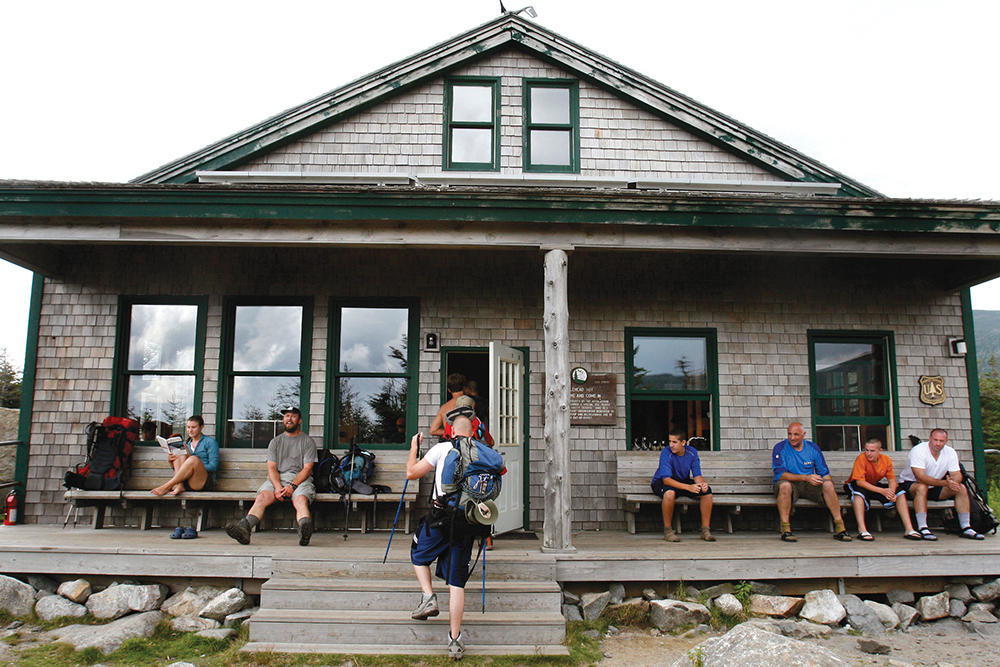 The Appalachian Mountain Club Galehead Hut in the White Mountains.Courtesy of AMC.
The Appalachian Mountain Club Galehead Hut in the White Mountains.Courtesy of AMC.
The awards were based on specific losses or expenses related to COVID-19, with higher awards going to nonprofits that depend on sales and fees for income.
Beyond these relief funds, nonprofits can also access monies from the $1.25 billion in federal CARES Act that target specific needs such as child care, education, affordable housing, public facility projects and historic renovations, says Reardon.
One caveat is that government funds must be spent by the year’s end. “There’s no clear sense of what’s going to happen in January,” she says of the funding landscape.
Typically, people give more toward the end of the year. “We shouldn’t turn away from that this year,” says Katie Merrow, vice president of community impact at the NH Charitable Foundation. The economic fallout and challenges associated with this public health crisis are likely to intensify in 2021, she says.
To help stabilize nonprofits and keep doors open, the foundation is pivoting to multi-year, unrestricted grants. But there’s “never enough,” says Merrow. Applications to the Community Grants Program are up 30% from last year, testifying to the heightened needs.
Virtual Fundraising Goes Viral
Gateways Community Services in Nashua is one of 10 agencies the state designates as a safety net for individuals with developmental disabilities and elders needing long-term care.
To protect against the spread of the coronavirus, the agency shifted some home-based services to a remote or hybrid model.
Not all of its clients participated, incurring a loss of revenue, says CEO Sandy Pelletier. Its adult day care program, held on the Alvirne High School campus in Hudson, was forced to close after 20 years of operation.
As a Medicaid-billing agency, Gateways receives limited state and federal dollars. Its resources depend on attendance, productivity and delivery, says Pelletier, and when that’s compromised, the onus to fundraise looms large.
At the beginning of the year, board members mapped out development goals with three live events. Then COVID-19 collapsed their ambitions. “We had to really rethink our processes and bring new tools to the toolbox,” says Pelletier.
The agency held its first virtual event and auction. “There’s a level of excitement and nervousness that goes along with that,” says Ruth Morrissette, director of development. “You want it to be successful, but you’re reaching out to people in a different way.”
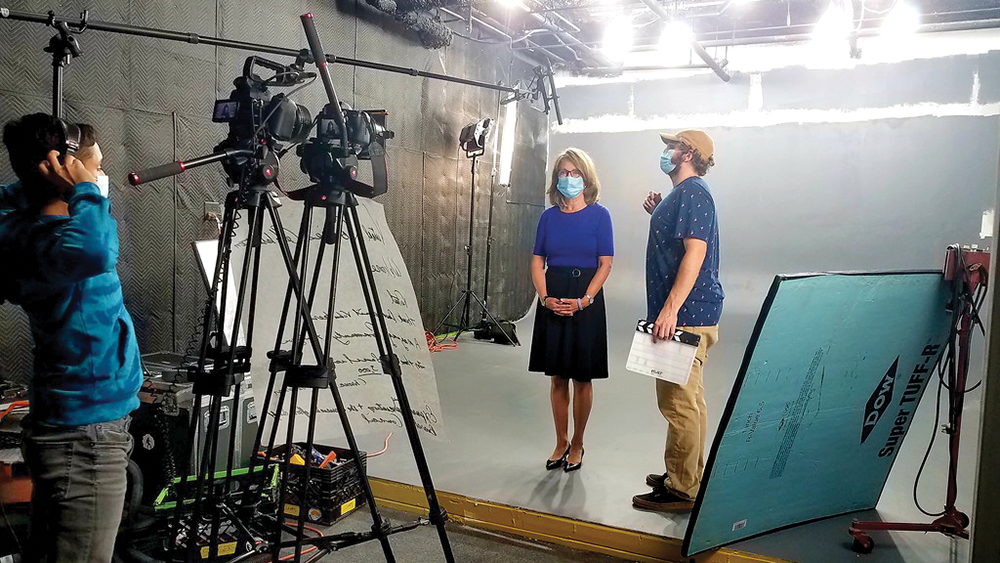
Gateways Community Services CEO, Sandy Pelletier, recording a welcome message for a virtual fundraising event in November. Courtesy photo.
Board members previously invited guests to a table, ushering in an audience to bid on auction items. Now they invite people electronically. There are no tickets to purchase and no appetizers to munch on while schmoozing with donors. “We’ve got fingers crossed” that interested parties will tune in, she says.
During the same week in November that Gateways hosted its virtual auction, the Nashua Soup Kitchen & Shelter produced its virtual gala and auction to meet most of its annual operating expenses. The event follows on the heels of last year’s standout, which reaped $185,000. “We were looking forward to our 20th season with the theme, ‘2020 Envisioning a Brighter Future,’” says fundraising chair Jane Goodman. “We’re still hoping that’s the case,” she says, despite securing only half the sponsors.
“There’s no buzz around a virtual event, as much as we try,” she says. While the nonprofit places radio spots, leverages social media, mails out save-the-date postcards and reaches out to past attendees, Goodman struggles to find auction items that don’t inspire travel. Red Sox and Boston theater tickets and vacation rentals lack the usual luster during a pandemic.
“We’re used to a live event,” says Goodman, “people having cocktails and getting dressed up. Now we’re going to have five people in the studio trying to get people to watch online on Facebook or YouTube.”
The Nashua Soup Kitchen and Gateways are producing videos showcasing families who benefit from their services. These pre-recorded tapings will air during the virtual galas. These videos need to be broadcast quality, says Tim Messina, owner of Events United in Derry, the company producing the Nashua Soup Kitchen auction. At a live event, he says, attendees succumb to peer pressure and keep their eyes on the presentation. Watching from home, they’re more likely to get distracted.
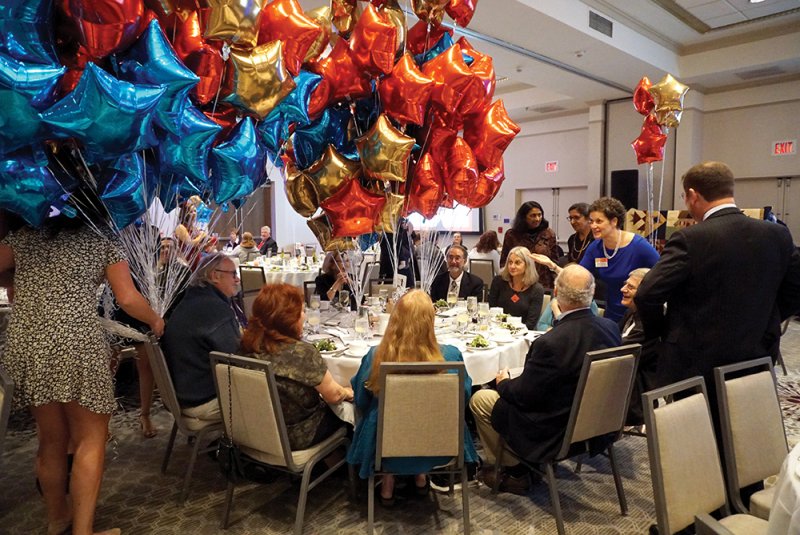
The Nashua Soup Kitchen & Shelter’s annual gala, seen here in 2019, went virtual for 2020. Courtesy photo.
Nonetheless, a virtual audience delivers an advantage, says Messina, because people can instantly pay online. That’s one reason, he speculates, the virtual fundraisers he’s produced eclipse the revenues of their previous live events. For instance, Girls Inc. of NH collected $175,000 in April compared to past revenues of around $100,000. “It could also be that people are saving money by being at home and have more money to give,” he says.
Crucial Grants
For nonprofits that don’t earn income from their services, a downturn in fundraising leaves them drowning in red ink.
More than 50% of the children in the Mt. Washington Valley who benefit from the early reading programs from the Believe in Books Literacy Foundation live in households making less than $30,000 a year, according to spokesperson Shelby Bellen.
Grants from the Tillotson Fund through the NH Charitable Foundation, the United Way and more than $450,000 of nonprofit relief monies from the state allow the nonprofit to continue bringing books to kids who are missing the perks of classroom learning. These funds are its financial backbone, especially when its biggest fundraiser, a family train ride from North Conway or Lincoln to visit “Santa’s workshop,” is running at reduced capacity to meet CDC social distancing guidelines.
Bellen says there are no plans to raise money through virtual fundraisers. One silver lining is that the COVID-19 crisis spurred more grant opportunities. Every application, says Bellen, asks how the organization will sustain itself through the pandemic.
“Well, honestly, we’re sustaining ourselves with these grant funds right now.”
Scaling Back
Many nonprofits will not survive unless they downsize. “For us, COVID was nothing less than devastating,” says Scott Slattery, executive director of the Greater Nashua Habitat for Humanity. “Donations dried up essentially overnight.”
It’s not that the community isn’t generous, he says. But donors focused their giving on providing school lunches, helping kids and assisting the most vulnerable. About 75% of Habitat donations are from individuals, the rest from corporations.
When the lockdown occurred, Greater Nashua Habitat for Humanity had begun site work for a duplex in Nashua for two military veterans. With HUD funding, they paid an outside contractor to pour the foundation. In May, Habitat International ruled it would not assume liability for volunteers to help build. That put the brakes on any further construction.

A duplex being built by Greater Nashua Habitat for Humanity. Courtesy photo.
Slattery had to make tough decisions. After the temporary shutdown of the Habitat Restore in Nashua, a used furniture and supply shop whose sales generate income to construct houses, he permanently closed the store. Amid virus concerns, Slattery couldn’t ask volunteers and staff to pick up second-hand items at people’s homes.
He also could no longer afford the rent for his Nashua office on Main Street. Now he and one remaining part-time employee work in a board member’s space in Hollis.
Slattery says projections for fundraising and team builds challenge him. He canceled the fall gala, choosing to forgo a virtual version. An organization needs a robust staff to pull off that type of event. “It’s this unknown right now that’s real scary,” he says.
And now nonprofits face the chill of January and February, which are typically lean times for philanthropic organizations coming out of the holiday season. “We’ll be OK because we’ve bare boned it as much as possible,” Slattery says. “But we can’t take our foot off the gas pedal,” adding that’s been the charitable sector’s mantra throughout the pandemic.

 Current Issue - April 2024
Current Issue - April 2024